|
|
|
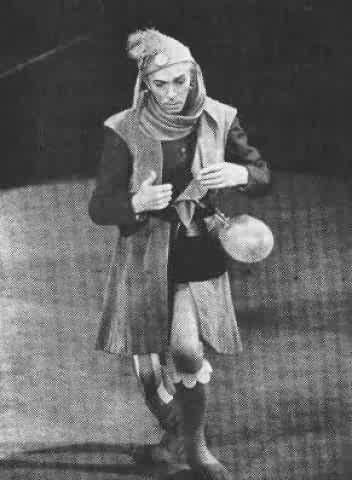 |
John, I saw you quoted in a newspaper recently as saying that Jack Point was one of your favourite G. & S. parts:
Yes, well Jack Point has always been the one that I've kept a little apart from the others-partly because he was so entirely different and partly because of the different problems of characterisation.
But really when people say what is your favourite opera, I don't put that in amongst them at all. it's the one apart, and I leave that out thinking, well, maybe it is my favourite - but I don't think it is in point of fact. I only like parts of it. I like the serious parts of Jack Point.
You know, the last scene. It's rather like anybody who can make people laugh also wanting to know that he's got the ability to make them cry as well. Really it proves that you can act in it I suppose.
But I think that my favourite part has always been, well, I think, Ko-Ko, because it's such fun to do and you know that you're getting all the reaction that you want from them, and you make people laugh, and the children and everybody enjoy him. And I suppose that's what our job is here anyway. To entertain people.
Do you think it is public reaction that makes it for you?
Yes, I do. That's what colours it for me anyway. Of course we do so many of them it's very nice suddenly to have a change and do "Patience" which is a very great favourite of mine. I think that's perhaps because I don't do Bunthorne as much as I do Ko-Ko. If I did as many Patiences as I do Ko-Ko, I think perhaps I would choose Ko-Ko as being my favourite between the two.
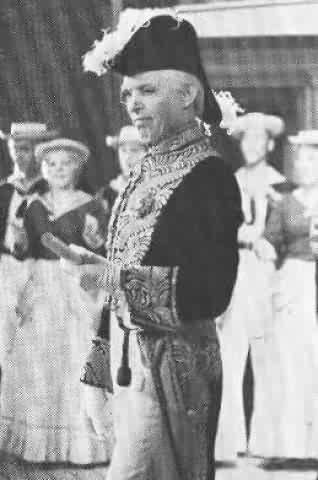 |
Now the other parts, like the older parts, are the ones that when I first took over I had to work harder on, because they were so non-me, you see. Clearly, anybody further removed from people like Sir Joseph Porter, for instance, there just isn't . . .I hope! He's a snob and he's always correct and I'm quite the reverse. So I had to work on those and I believe they turn out to be my best parts because of that. Or I've grown old into them or something like that . . . maybe that's it!
Quite honestly, my juveniles now, I call them my character make-ups!
Which others in the older range of characters would you pick out?
I'm very fond of the Duke of Plaza-Toro now that it's been re-done by Anthony Besch - I prefer the new Duke to the old one. It all knits together much better really.
As an artist, which side of the characters you play appeals to you yourself most?
I like anything where the dancing comes in. I must say that, because however I worry about words and music - as anybody can - I never ever worry about the dancing.
I mean, I could fall flat on my bottom and it wouldn't bother me at all. But I can miss a word and I'm upset.
For instance, since I've started, I've never particularly liked those speeches that I have to say to her in "Pinafore" . . . things like "Madam, it has been represented to me that you are appalled by my exalted rank. I desire to convey to you officially my assurance that if your hesitation is attributable to that circumstance, it is uncalled for." . . . it's so non-me. And once I get that out I think... that's that over, I could easily have messed that up. But when they start to dance-and it goes on much longer than anything else that goes before - I have no more worries. None at all. I think when I'm reincarnated I'm coming back as a dancer!
What are your favourite dancing parts then?
Well, it's not what I'd call real dancing - it's more movement. But I suppose the new arrangement rather than dancing in "The Sorcerer" . . . maybe because it's new I like "The Sorcerer."
Now that you've 'run-in' John Wellington Wells, what do you think about him?
Oh, I like him very much - I'm not finished with him yet, by any means. It's just beginning to form. As I've said before, when I first got the costumes that I wear, when you first take over, they're not yours. They don't belong to you. And, in fact, they are exactly the same costumes, some of them, as I got in the first place - and now I fit them. Now they belong to me. Now I put them on like I put on my own suit.
How long do you reckon it would take you to get right into a part?
Oh, quite a number of years. Because now, I've said before, if anything comes undone on the stage like a little button here, I can put it right without even looking down. It's like your own trousers or your own jacket. You would know exactly where that button was. It now belongs to you and so I think that your costumes almost fit round you like the characters do. I should say that as soon as - you say how long does it take - well, as soon as the character adjusts itself correctly, then so does the costume with it. It's almost as if when you get the costumes right then the character is right.
Do you remember which was the first character you got right out of all the principal roles you've played?
I don't think I've got any of them quite right yet! One works and each time I shudder to think what I was like last year compared to what I am this year. Maybe no different at all but one feels one's getting a bit better with it. This is why I'm always so ready when, as with the Duke, there is any new work we can do on the parts to re-characterise them. It makes us very happy to work on them.
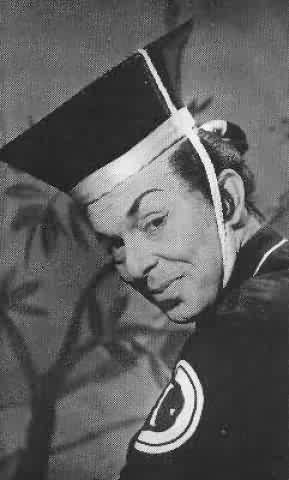 |
Which was the one you were happiest with in 'breaking-in', then?
That's a very difficult question, for when you first take them over there's such a lot to do. It's not just like doing Ko-Ko for a whole month. You do Ko-Ko one night and something else the next night, and because of that it takes longer. But I think Ko-Ko must be the one that fitted into place first because Ko-Ko is almost me. There's a lot of me in the character. It lets me bring out my sense of humour and delivery of lines. It allows that.
It's closest to your own character, you feel?
Yes, I do. I reckon that one person can play a part equally as well as another but in a different sort of way. I think that Peter Pratt, for instance, played Ko-Ko as a soulful little fellow-timid, frightfully shy. But mine's cheeky, I think.
It doesn't mean that it was any the less good for being the way that Peter played it. It suited him better - but I couldn't play it as Peter played it.
But this couldn't apply to the character parts because there's no doubt about it that you must get your own personality through. Nevertheless, Sir Joseph Porter is a snob anyway, and there's not so many ways to play a snob. but just be a snob and curl up your lip or whatever. There's a bigger variety in what you can do with a part like Ko-Ko.
He could be an old man, a fat man, a young man-he's ageless as far as I'm concerned, Ko-Ko. Whereas there is a set age almost for these other older parts - well, round about. But a person like Ko-Ko to me is just any age.
John Wellington Wells, of course, is the great extrovert character, isn't he?
I think I like these sort of parts. If I am playing it in Cockney, I try but it needs more acting than you would if you're just going to use your normal voice. You're going to have to bring out something different. I don't have to do that as Ko-Ko. I just play Ko-Ko as I speak normally, only project it. But I've got to change my voice if I'm going to play a part like the First Lord.
If I play Gama. I've got to crack my voice and be acid. Now the same applies to the Sorcerer where I've got to put on a Cockney voice.
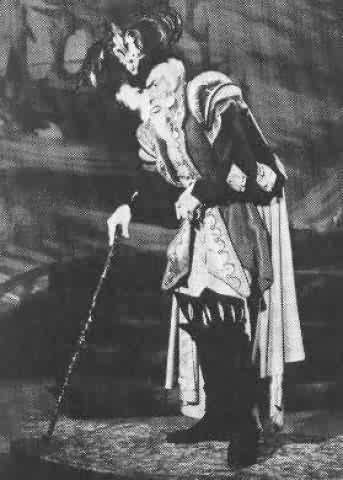 |
You mention King Gama-can we discuss him?
Well, when I first played Gama, I don't know whether it was said in so many words, but it seemed that I made him too nice - the wig was nice and clean and everything else like that - and I think the company and Miss Carte thought I was much too nice for Gama. Really because I felt sorry for poor old Gama. As is me, I felt sorry for this little old man who's got a hump on his back and so I had so much sympathy with him. But since I wasn't laying it on thick enough I said OK, so here goes, if that's the way you want it I can do it that way. And maybe I went too far. I don't know. But now I get what I call my Gama throat after I've finished playing it. And now I can't play it any other way. People might say, well, don't lay it on so thick - but I can't. I have to crack and scream and screech or whatever. But they asked for that anyway, so if it's too much for them I have to say you asked for it and you got it. They dirtied the wig down and a few things like this, and I went to town on it.
We haven't spoken about the Lord Chancellor at all yet, have we?
The Lord Chancellor's nice . . . I like him very much actually, although I often wish he didn't have the Nightmare Song because it's a bit of a marathon isn't it, really, when you think about it. And one knows it so well that one begins not to know it almost, and this is what you've got to watch. After singing it as many times as I have it begins coming out parrot-fashion, and in the middle of the song you can pull yourself up and say to yourself "What am I talking about? Have I sung that bit?"
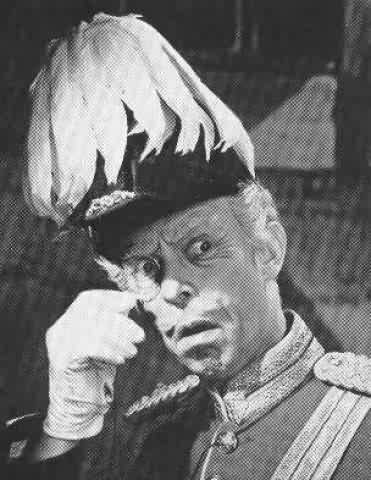 |
Mind you, I don't think that song, that particular song, is as bad as some of the others. For instance, in the Major-General's Song, which is a lot of gibberish, anyway, a lot of disconnected things following one another. if you analyse the Nightmare Song, it does follow through. There's some continuity there. You know - "You're a regular wreck, with a crick in yer neck" and it all follows through like 'And you dream you are crossing the Channel and tossing about in a steamer from Harwich, which is something between a large bathing machine . . . and you're giving a treat. . ." It's a story being told.
I remember you telling me the story which you told on the Scottish Television programme about G. & S. & D'Oyly Carte' about the night you couldn't get off that steamer from Harwich ?
Yes, because I couldn't get that following word. "And you dream you are crossing the channel and tossing about in a steamer from Harwich". Instead of saying "which" I said "and". So you go on again. "And you dream you are crossing the channel and tossing about in a steamer from Harwich, And you dream you are crossing the channel and tossing about in a steamer from Harwich And you dream . . ."
Because I couldn't find "Which". As soon as I got "which" I'm off! But these are all the little traps you can fall into. Once you've done it, once you've made any mistake on stage, no matter how many years pass by, whenever you sing over that part you think right back to the moment you made it. I do anyway. I know that as the First Lord I went out and sang "When at anchor here I ride, My bosom smells with pride" instead of 'swells' - now that's only a letter. But you see I have two now to choose from - "smell' and "swell' and I never, ever, sing that song but in a flash I say "which one is it?" Pick the right one or else you're dead as a duck. And it's always a curse to you. If you've ever made a flop it's there, it's somewhere there settled down in you, and so you guard it, all the time. And the more you play a thing like the Nightmare Song, the more places you've got to guard. The more places you've slipped up some time, and so you've got so many points to watch.
What about Robin Oakapple?
I like Robin Oakapple. I think maybe I'm a bit old for it now. And it's a pity because I feel him. I feel I'm so fundamentally a young person - I am a young person you know. I mean I'm older than the part I'm playing, for instance, but I feel young. That's what's difficult about it. And that's what's a bit sad about it that he'll have to go pretty soon.
I was just thinking today that perhaps it would be a good idea if I went over all the parts again and changed one or two slightly - or if someone would do it for me so that I could get a new slant on them maybe. I'm always willing to do that. Rather like what they did with the Duke, and certainly, not that I've played it before, with the Sorcerer, who was never played as a Cockney. I think there might be a new way to do them all.
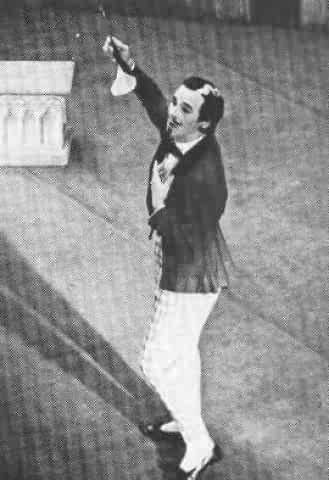 |
That's an interesting thought. But do you think that the fan's would accept that?
Yes, the fans would accept it. Certainly I think that you would have to educate the fans into accepting it. As an instance I remember when I was playing the Duke and they decided that they were going to change the colour of the wig and they gave me a red wig-a long red, curly wig. And when I came out of the stage door after wearing it for the first time - it was a new production and out of all the things that were new a girl fan I recognised stopped me and suddenly said : "I don't like the new wig." It had annoyed her. Now I played in that wig for about two years and they decided to bring it back to the smaller white wig. The first time I wore it, who should I meet again at the stage-door afterwards but this same girl. "Oh, I do miss the red wig," she said.
People go off about "The Gondoliers". I get letters saying: 'Please give us back the Duke we learned to love and adore' . . because of all the encores they used to have. But if they saw the old production now - if it was possible to bring it back next week - I'm quite sure they wouldn't like it as well as this production. It's the same sort of principle. None of us ever come up to the old ones - we're all doing the same job in fact as Henry Lytton, and Martyn Green, and Bertha Lewis and everybody else. But to the old ones we're not as good as they were. We never will be until we're dead and gone!
But if you could bring those operas back - I'm not saying they wouldn't adapt themselves immediately under these modern conditions - but if these productions were to come back, they would be 'hammy' and they would probably be laughed off the stage.
Because we've moved so gradually - for all that we're saying the same lines, it's in a modern way. You've just merely to look at some of the old photographs and I think you can laugh and smile at some of the costumes that they used to have, and the make-up with their little rose-bud mouths.
That rather gives the lie to the theory that Gilbert's original stage directions must be followed at all times. I'm all for tampering with the directions, because I think that Gilbert's directions have dated just the same as anything else. His words and the music live on - and, of course, the great tradition of the D'Oyly Carte company, which has been handed down through the generations.
| Artist Index | Main Index |